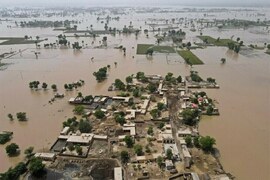The future of US overseas detention sites must be examined case by case, Homeland Security Secretary Janet Napolitano said on Tuesday, indicating moves to shut Guantanamo Bay may not serve as a model for other prisons. Critics have long seen Guantanamo as a stain on the US human rights record.
Napolitano said the US prison camp on Cuba had helped armed groups recruit militants because it had not been run in line with US values, and President Barack Obama was "very intent" on closing it by January 2010. "In particular Guantanamo, as you know, has become a recruitment tool... That's one of the reasons, when we do an analysis of 'Guantanamo open or closed?', the analysis is that we're better off with it closed from a safety aspect."
Asked if that analysis also applied to other detention centres such one at the main US military base at Bagram in Afghanistan, she said: "Each has to be considered in their own way. They're located in different places, they have different sets of detainees and I wouldn't paint that broad a brush."
There are 229 captives still being held at Guantanamo. The camp, opened after the September 11, 2001 attacks on the United States, drew international criticism for holding prisoners indefinitely, many without charge. US President Barack Obama ordered its closure within a year in one of his first acts of office, but has yet to decide what to do about Bagram, where more than 600 prisoners are held.
Obama is lobbying allies in Europe to accept prisoners from Guantanamo who are not seen to pose a security threat but cannot return to their home countries because of a risk of torture. Napolitano, on a tour which has already taken her to Ireland, said she would also travel to Portugal, Spain and Kuwait to discuss aviation security, cyber security and violent extremism. Napolitano said she would not be asking these countries to take in Guantanamo detainees on her trip because that effort was being led by the US State Department.
She added the Obama administration still hoped to overcome resistance in Congress to its plan for transfers of some detainees to the United States but it was "impossible to say" when that effort would yield concrete results. Some US lawmakers who have expressed concern about bringing Guantanamo Bay prisoners to the United States say it would be too dangerous even to hold them in jail.
Lawmakers "want and deserve to have concrete information on which detainees, what's the cost and those kinds of details are bring worked up now", Napolitano said. Earlier in June, nine prisoners were transferred to Saudi Arabia, Bermuda, Iraq and Chad. One prisoner, Ahmed Khalfan Ghailani, accused of involvement in the 1998 US embassy bombings in Africa, was sent to New York and became the first detainee transferred to the United States for trial by civilian court.
BR100
15,235
Increased By
150.4 (1%)
BR30
44,824
Increased By
812 (1.85%)
KSE100
149,971
Increased By
1353.3 (0.91%)
KSE30
45,655
Increased By
407.2 (0.9%)






















Comments
Comments are closed.